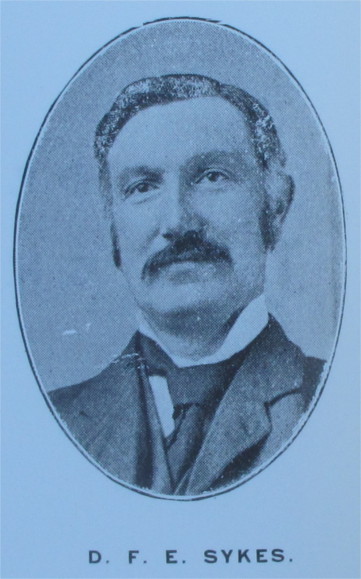Sister Gertrude,
A Tale of the
West Riding.
BY
D. F. E. SYKES, LL.B.
Author of “The History of Huddersfield,”
“The History of the Colne Valley,”
“Ben 0’ Bill’s, the Luddite,”
“Tom Pinder, Foundling,”
Etc., Etc.
SIXTH THOUSAND.
WORKER PRESS, 47, MARKET STREET, HUDDERSFIELD.
About the author

D F E Sykes was a gifted scholar, solicitor, local politician, and newspaper proprietor. He listed his own patrimony as ‘Fred o’ Ned’s o’ Ben o’ Billy’s o’ the Knowle’ a reference to Holme village above Slaithwaite in the Colne Valley. As the grandson of a clothier, his association with the woollen trade would be a valuable source of material for his novels, but also the cause of his downfall when, in 1883, he became involved in a bitter dispute between the weavers and the mill owners.
When he was declared bankrupt in 1885 and no longer able to practise as a solicitor he left the area and travelled abroad to Ireland and Canada. On his return to England he struggled with alcoholism and was prosecuted by the NSPCC for child neglect. Eventually he was drawn back to Huddersfield and became an active member of the Temperance Movement. He took to researching local history and writing, at first in a local newspaper, then books such as ‘The History of Huddersfield and its Vicinity’. He also wrote four novels. It was not until the 1911 Census, after some 20 years as a writer, that he finally states his profession as ‘author’.
In later life he lived with his wife, the daughter of a Lincolnshire vicar, at Ainsley House, Marsden. He died of a heart attack following an operation at Huddersfield Royal Infirmary on 5th June 1920 and was buried in the graveyard of St Bartholomew’s in Marsden.
Introduction
In all of Sykes’ novels he draws heavily on his own life experiences though none more so than in this, his third, semi-autobiographical novel. The Edward Beaumont of the novel is indeed Sykes; his solicitors practice and early political aspirations are featured along with his romance of the daughter of a Lincolnshire vicar. From newspaper articles we can also confirm that he was a councillor and a potential parliamentary candidate for the West Staffordshire constituency; his embroilment with the weavers dispute, bankruptcy and his dependency on alcohol are also well documented. He is however selective in what he chooses to reveal about himself and uses artistic licence to make the book more readable. He does give us an insight into his ideas, opinions and aspirations and the turmoil he must have endured before turning his life around. It is a salutary lesson in how a talented man can be destroyed for his convictions and his struggle, with support, to regain his self-respect.
SISTER GERTRUDE.
CHAPTER I.
It was a summer evening of the early eighties, and market-day in the ancient manufacturing town of Huddersfield, in the West Riding. The town is called a manufacturing town in the geographies, and its name may be found therein among the leading centres of the great cloth industry. As a matter of fact, thou